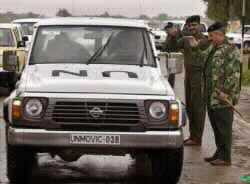U.N. arms experts visited an agricultural facility and a military industrial complex near Baghdad on Sunday, the fourth day of inspections in a hunt for Iraqi weapons of mass destruction. A team of inspectors drove to an airstrip for small planes used in spraying pesticides on crops at Khan Bani Saad, some 30 kms northeast of the Iraqi capital. The facility is run by the Agriculture Ministry. The experts blocked anyone or anything from entering or leaving it and stopped the Iraqi employee in charge of warehouses from going in with them. Journalists were also stopped from entering the facility.
A second inspection team went to Ibn Firnas military industrial compound at Rashidiya, 20 kms northeast of Baghdad. The compound produces electrical equipment for military and civilian use.
It had been bombed during the 1991 Gulf War over Kuwait.
Weapons inspections resumed in Iraq on November 27 after a four-year gap in line with a U.N. resolution passed last month giving Baghdad one last chance to disarm or face war.
Iraq, which denies it has any nuclear, chemical or biological weapons, has pledged full cooperation with the inspectors. It has to submit a declaration of any banned weapons by December 8.
An Iraqi official newspaper said on Sunday the inspections would prove Iraq was free of banned weapons but that might not be enough to avert war.
"No one in the world should be surprised if the evil-doers in Washington and London manufactured a new problem or crisis at any day," al-Thawra daily said.
"Their real goal is not to make sure that Iraq is free of weapons of mass destruction, which they know it is, but to look for a pretext for aggression."
It said sites visited last week were alleged by U.S. President George W. Bush's administration and the government of British Prime Minister Tony Blair to be involved in weapons of mass destruction weapons. It said the inspectors found nothing.
"But will the Bush administration and Blair government refrain from making allegations and claims? Will they refrain from creating problems? Will they stop from creating new pretexts?" Thawra said.
It also warned that spies could infiltrate the inspections teams to create problems.
"SENSITIVE SITE"
On Saturday, the inspectors, from the U.N. Monitoring, Verification and Inspection Commission (UNMOVIC) and the International Atomic Energy Agency (IAEA), examined two Iraqi military industrial plants and an army base.
The UNMOVIC team examined the Iraqi army post near Balad, 75 kms north of Baghdad, a site identified by Iraq as "sensitive" -- which in the past only meant limited access for the inspectors.
The inspectors, who had full access, spent five hours at the post looking at equipment and speaking to commanders.
The site, known as the Chemical Defence Battalion, which reports to a unit of the Ministry of Defence conducts training activities in the area of chemical, biological and radiological defence for military personnel.
On Sunday, the inspectors were expecting the arrival of the first of several helicopters. The shipment, arriving by aircraft, would include electronic equipment ordered by the inspectors to scan their operations centre at Baghdad's former Canal Hotel against possible bugging.
In Berlin, the German Defence Ministry said on Saturday it was considering a request from the inspectors for unmanned reconnaissance planes.
The "Luna X-2000" aircraft are equipped with digital colour and heat-seeking cameras and would be used to fly over large and difficult to access chemical or industrial complexes.
A German Defence Ministry spokesman told NDR radio that one reconnaissance unit was composed of 10 to 12 of the drones.
PHOTO CAPTION
Iraqi officials salute the U.N inspections team after they finished searching for weapons of mass destruction at an Iraqi military post at Balad, 80 kms north of Baghdad, on November 30. REUTERS/Suhaib Salem
- Author:
& News Agencies - Section:
WORLD HEADLINES


 Home
Home Discover Islam
Discover Islam Quran Recitations
Quran Recitations Lectures
Lectures
 Fatwa
Fatwa Articles
Articles Fiqh
Fiqh E-Books
E-Books Boys & Girls
Boys & Girls  Hajj Rulings
Hajj Rulings Hajj Fatwas
Hajj Fatwas














